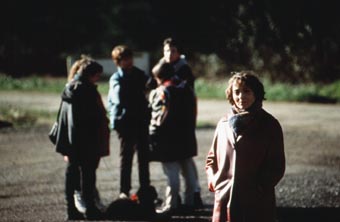
Die Diebin von Saint Lubin /
The Thief of Saint Lubin
Claire Devers, Frankreich 1999
Produktion: Agat Films & Cie,La Sept/Arte
Weltvertrieb: Mercure Distribution
27, rue de la Buttes aux Cailles,
F-75013 Paris
Tel.: (33-1) 44 16 88 44, Fax: 45 65 07 47
Buch: Claire Devers, Jean-Louis Benoit
Kamera: Hélène Louvart
Musik: Béatrice Thiriet
Ton: Laurent Poirier
Schnitt: Marie Castro, Monica Coleman
Darsteller: Dominique Blanc, Denis Podalydès, Michèle Goddet, Maryline Even
Format: 35mm, 1:1.85, Farbe
Länge: 85 Minuten, 24 Bilder/Sek.
Sprache: französisch
Arsenal 11.02. 22,00
Babylon 18.02. 19,00
Delphi 19.02. 21,30
CineStar 5 20.02. 12,30
CineStar 8 20.02. 19,30
Françoise Barnier ist kein politischer Mensch. Aber einmal im Leben fühlt sie sich versucht, die rechtsradikale Front National zu wählen. Die Wahl geht ganz einfach vonstatten, im Schutz einer Kabine. Ohne direkte Auswirkung auf ihr Leben. Harmloser Akt einer Bürgerin, für den man sie ohne Zweifel kaum verurteilen kann. Der Film hinterfragt diese beiden Akte – den Fleischdiebstahl, das Votum für die Front National – und den damit verbundenen Tabubruch.
Françoise Barnier once committed a theft. Her situation was critical,
but no more so than usual. She was not in debt. She had always rejected
the degradation of unmanageable debt and reliance on charity, and had
struggled to live according to the rules laid down by society and the
law. But that day, she stole. Trapped in a dead-end life of endless frustration
and deprivation, she chose to commit an act, the violence, futility, and
absurdity of which she recognized, but one that somehow made her feel
liberated, as if she were cutting the Gordian knot. We witness her progress
through the judicial system, during which two concepts of justice and
the law will be brought face-to-face.
Françoise Barnier is not politically sophisticated. However, at
one stage in her life she’d been attracted by the far-right National
Front. She voted once, easily, in the safety of a voting booth.The vote
had no direct impact on her life. It was a banal civic act for which she
could not possibly be penalized. She would never be forced to explain
why she did it, the way she had to explain why she stole. And yet, her
vote left her with a feeling of genuine guilt. Worse yet, with a feeling
of vain futility that made her ashamed. She couldn’t discuss this
act with anyone. As with the theft, she’d snapped. But this time,
she couldn’t snap back again. The film examines the two acts –
the theft of meat and the vote for the National Front – and their
inherent violence.
Claire Devers, geb. 1955 in Paris. Studium der Philosophie an der Sorbonne, danach Filmstudium am IDHEC. 1986 die Camera d’or in Cannes für ihren Debütfilm Noir et Blanc. Fernsehregisseurin. Filme: Chimère (1989), Max et Jérémie (1992), Mylène (1996).